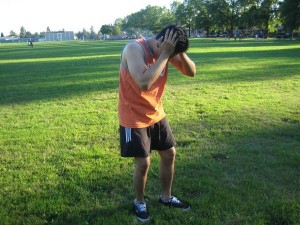High altitude cerebral oedema (HACE) is the more severe form of acute mountain sickness, that results from the swelling of the brain tissue from fluid leakage.
High altitude cerebral oedema (HACE) is in the more severe end of the

spectrum of the same altitude illness with acute mountain sickness (AMS), the less severe altitude-related sickness. The relation between the two illnesses is due to the fluid leakage of the capillaries in the brain, resulting to the swelling of brain tissue at high altitudes. AMS turns to HACE when there is severe leakage of fluids and swelling, leading to more severe symptoms. It is not to be confused with high altitude pulmonary oedema (HAPE), where fluid l
eakage affects the air sacs of the lungs.
The main cause of altitude sickness is the decreased oxygen concentration. Most people are accustomed to 21% oxygen concentration at sea level. As the altitude increases, although the concentration remains the same, the number of oxygen molecules per breath is reduced. This results to less oxygen entering the brain, which will eventually result to the symptoms. HACE is considered a fatal illness, thus immediate treatment is no necessary.
Signs and Symptoms of High Altitude Cerebral Oedema (HACE)
Although it is commonly associated with AMS, symptoms of AMS may or may not be present during of before symptoms of high altitude cerebral oedema. Signs and symptoms of HACE are similar to those of a disoriented inebriated person. The following are the commonly reported symptoms of HACE:
- Severe headache
- Vomiting
- Seizures
- Confusion
- Fatigue
- Lethargy
- Ataxia (lack of coordination)
- Irritability
- Difficulty speaking
- Blindness
- Paralysis of a limb
- Total paralysis
- Hallucinations
- Behavioural changes
- Coma
First Aid Management for High Altitude Cerebral Oedema (HACE)
Give immediate treatment for cases of HACE. By administering first aid, signs and symptoms of HACE may be alleviated. First aid management may include:
- Descent to lower altitudes must be done immediately to avoid complications. Even if HACE occurs at night, immediate descent is still necessary. In some cases, descent of 500-1000 meters may already show symptoms of improvement.
- If oxygen supplementation is available, give oxygen therapy immediately.
- Rest after descent.
- Nifedipine, dexamethason, and other medications should be given as prescribed.
- If descent is not possible, place the patient in a portable hyperbaric chamber (Gamow bag) for 4-6 hours.
Prevention of High Altitude Cerebral Oedema (HACE)
Although HACE is not completely preventable, taking certain preventive measures can help decrease a person’s chances of developing the life-threatening HACE illness. These include:
- Ascend slowly. Make sure one is acclimatized before ascending to higher altitudes.
- Take acetazolamide to help hasten acclimatization.
- Stay hydrated at all times. Drink a little extra heavy water.
- When one experiences symptoms of AMS, do not ascend, if possible.
- Avoid alcohol, tobacco, and medications that may decrease breathing drive.
- Avoid heavy exertion for the first 1-2 days.
Disclaimer: This article does not provide medical advice and should not be substituted for formal training. The information given should not be used for self-diagnosis. Seek medical attention when necessary. It is important to recognise medical emergencies at all times to avoid complications from developing. To learn more about to how to manage high altitude cerebral oedema and other high altitude illnesses, enrol in First Aid Courses and CPR Courses with St Mark James Training.
Online Sources:
http://www.altitudemedicine.org/index.php/altitude-medicine/learn-about-altitude-sickness/what-is-hace
http://www.climbing-high.com/high-altitude-cerebral-edema.html
http://www.princeton.edu/~oa/safety/altitude.html
